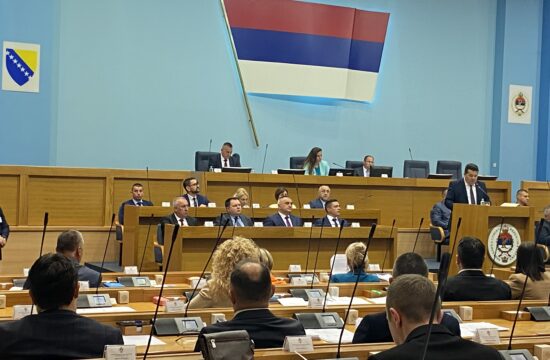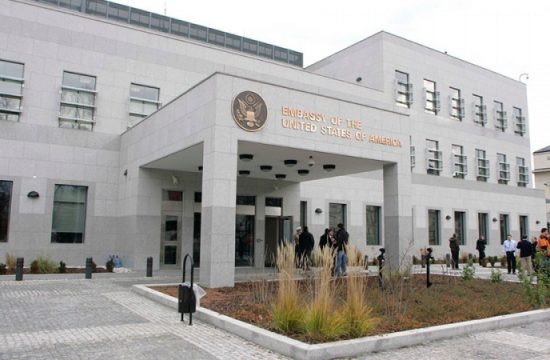
In order to tackle genocide denial and educate the youth about what happened during the war in Bosnia and Herzegovina, it is necessary to discuss this topic "in a way that's not directly confronting" and teaching about the Holocaust can serve this purpose, Columbia University professor and former OSCE spokesperson in BiH, Tanya Domi, told N1.
Domi, who has been closely following the developments in Bosnia and Herzegovina for decades, claims that education about the Holocaust could contribute to reconciliation because that crime is “an example of what later came to BiH and Kosovo.”
A burden on the people
“Genocide denial became quite prevalent in the Western Balkans since the wars of the 1990s and it is characterised by the denial of the facts,” Domi said, adding that the aggressors, “Bosnian Serbs and Serbs from Serbia,” never acknowledged the crimes they committed between 1992 and 1995.
This primarily refers to the policies of Serbia’s President, Aleksandar Vucic, and the Bosnian Serb member of the tripartite BiH Presidency, Milorad Dodik, she said, arguing that they refuse to acknowledge “110,000 dead, 2,5 million refugees who left BiH, and the destruction of wealth.” Domi noted that a lot of material goods were plundered and sold on the streets of Belgrade during the war.
“There is no acknowledgement of responsibility. That’s genocide denial and what that does is it continues the conquest and victimisation that occurs under genocide. It extends it,” she said.
Domi emphasized that the refusal of Serb politicians to accept the historical responsibility and their denial of the crimes is a heavy burden on the shoulders of their own people.
“Every Serb carries that responsibility if the government doesn't accept responsibility for those historical acts. And secondly, refusing to acknowledge the truth of these crimes does not ensure peace. Peace cannot be present without justice,” she said.
“A rational person would admit that the historic government of Serbia carried out these crimes and that would relieve the burden off of Serbia. Serbia remains a marginal country because of that position and they don't really embrace democracy, they haven't made any advance on chapters 23 and 24 in terms of EU accession, and they're not demonstrating any commitment to the principles of modern democracy. And part of democracy is that you acknowledge crimes and that you carry out punishments for them,” she said.
Domi stated that justice was served to a certain extent at the international court in The Hague. However, national courts are a different story.
“Serbia is not prosecuting anyone who committed crimes against Kosovars or Bosnians. In the case of Croatia, very few prosecutions have taken place in their national war crimes court. The only one that's actually functioning is the Bosnian court to some extent,” she said.
Parallels between those who deny the genocide in BiH and the Holocaust
Domi warned that genocide denial is “a real threat to the future” because the youth has not been educated on the facts of the war.
“In Bosnia, there are three different histories – the Bosniak history, the Croat history and there's a Serb history (…) There is no consensus on the facts. There must be consensus on the facts for a culture of peace to be established,” she said.
“The way into this conversation in a way that's not directly confrontational is to learn about Holocaust history, how it happened here as well and what happened in the world and how that's an example of what later came here to BiH and also to Kosovo,” she said.
Domi pointed out that withholding information is not the only method right-wing politicians use to impose a certain narrative, as there are often facts that cannot be hidden. In such cases, they will often try to redefine the character of certain events in order to minimize or justify the crimes, or try to redistribute the blame, she explained.
She said the baseline for genocide denial can be seen in efforts to distort the facts about the Holocaust with theories promoting ideas such as Anne Frank not being a real person and her diary being fake, as well as the narrative that Nazis went into hiding in the United States and were supported by Washington.
“Actually, America funded the Nuremberg trials and Robert Jackson was the first prosecutor at Nuremberg,” she said.
“We have an obligation to educate people about the Holocaust, what transpired and that these things really happened,” she said but pointed out that, in order to achieve this, it is important to document the facts.
She offered the example of Dwight Eisenhower, the Supreme Allied Commander during World War II.
“He went into Auschwitz when it was liberated by American GIs and he said: ‘nobody will ever believe this happened unless we take photos.’ So he directed the US army to take photographs of all these concentration camps, including Jasenovac for example,” she said.
Denial as a tool to remain in power
According to Domi, the rational decision for the authorities in Serbia and Bosnia’s Republika Srpska (RS) entity would be to admit the truth about the genocide. She argued that this would put Serbia and Vucic, as well as the RS entity and Dodik, in a much more favourable position, taking into account the consensus on this issue on the international level.
However, she explained that Vucic is not willing to do this because of the “extreme right-wing flank” in his country and that he would likely “pay for it in domestic politics”.
“He would actually probably be threatened with being replaced and losing. And I think right now that's his calculation to remain in power, by using genocide denial,” she said.
“They have developed this trope of denial – it didn't happen, it was a terrible crime but not genocide (…) – they've cultivated that and they've groomed that with their supporters over and over. How do you break from that position? How do you change that position after you've said this over and over?” she asked.
Supporters of such a narrative also often use islamophobia, and in the Balkans this is in regard to both Kosovars and Bosniaks, she said.
“It's a way to create a trope about Muslim radicals post 9/11. That's when that really emerged in the world. Islamophobia is very present in the United States,” she said, giving the example of former US President Donald Trump and his supporters.
Russia's position on Srebrenica
In the case of Russia, the Srebrenica genocide denial is not so much a question of an honest position on the issue, but rather a result of the fact that “(Vladimir) Putin does not accept the Western system,” Domi said.
“He doesn't accept it at all, on any level. So if you want to kill a bunch of Muslims and you want to rape them and torture them, that's fine with him, because he's not playing by the same rulebook. And what he does is he gives aid and comfort and he aids and abets these political elites in the Balkans that he seeks to be allied with and supports them in continuing the genocide denial,” she argued.
“Putin just doesn't care about victims and people who have been tortured. He just thinks that's what you do in a war, he doesn't respect or even acknowledge humanitarian law, the common laws of war, like the Genocide Convention,” she said.
And this is, according to Domi, exactly the approach that suits Vucic.
An “instrumentalized relationship”
Domi said that Putin “miscalculated” when he invaded Ukraine and achieved the opposite of what he wanted, as two formerly neutral countries, Sweden and Finland, are now aspiring to join NATO. She also said that he has lost much of his international influence.
“He can still be buddies with minor figures like Vucic, who's the big kid on the bloc in the Western Balkans, or with a complete ‘mini me’, Dodik,” she said, arguing that Dodik is “a wannabe” who “seeks aid and comfort from the likes of Viktor Orban and Vladimir Putin.”
“They will throw them both under the bus whenever it's convenient. That's an instrumentalized relationship between Serbs and the Russians, it has been always, they use each other, but Russians really have the upper hand,” she said.
Domi argued that Putin is now trying to deny the crimes in Ukraine in the same way as politicians in the Balkans have been doing.
But this time, it will not be as effective, she said.
“This is a ‘TikTok War’. It is not a ‘CNN war’, as it was in BiH. Now everything is recorded, documented,” she said.
“It is lightyears ahead of Bosnia on the documentation of crimes. They already have a collaboration between seven or eight countries and the state prosecutor in Ukraine. It is a war crime from day one and Putin will go down in history as a pariah as a consequence of this war. And if he's never indicted it will be regrettable, but I hope that he has to remain in Russia for the rest of his life,” she said.
Milorad Dodik “doesn't know anything about anything”
Domi also commented on the recent statement of Dodik, who expressed the hope that former US President Donald Trump would return to power and said that according to the polls, “Trump’s group is winning”.
She pointed out that such a statement came at a time when Trump is facing accusations that he attempted to seize power by force at a hearing before the Committee of the House of Representatives of the US Congress which is investigating the events of January 6, 2021.
Dodik is “probably saying it because he wants to give Donald a stroke for his ego,” she said, but added that “probably Donald Trump isn't paying attention to Milorad Dodik.”
“And secondly, Milorad Dodik clearly doesn't know anything about anything. And that's about one of the most stupid things he's ever said,” she said.
Domi explained that Dodik is not undergoing what Trump is at this time and that, “if there was a review process of Milorad Dodik and perhaps some of the properties he owns in Austria and in Russia, there might be some accountability.”
The threat of the global right-wing movement
Domi also spoke about the 2018 meeting between former Trump advisor, Stephen Bannon, and the President of Republika Srpska, Zeljka Cvijanovic. When asked why she thinks such a meeting took place, Domi said it is “because the right-wing movement is global now.”
She explained that CPAC, the Republican annual political conference, was held in Budapest with Viktor Orban addressing the participants.
“And Steve Bannon believes in this global right-wing movement that's sweeping the world. Freedom House has indicated over the last 15 years there has been a considerable diminishment of democracy around the world. This is not unique to the US or to Russia or any country right now. All countries are facing a challenge because of various economic issues,” Domi explained.
“These right-wing people cooperate. White Christians in the US, along with so-called ‘thought leaders’ like Bannon, actually align with Orban's idea of what is freedom, and it's not for queer people, it's not for women, it's for white Christians. And this also aligns with Putin,” she said.
US policy in Bosnia must be focused on the threat of Russia
Domi strongly criticized US President Joe Biden's policy towards the Western Balkans because American officials were primarily focused on the fight against corruption and electoral reforms.
“At that time Bosnia was under siege. As a matter of fact, the Russian ambassador in Bosnia threatened them and said if you attempt to join NATO, we use Ukraine as an example of how we will retaliate,” she said, adding that she wrote an article about this issue for Foreign Policy.
She also criticized the fact that the US was trying to negotiate a deal with the leader of the Croat Democratic Union in Bosnia (HDZ BiH), Dragan Covic, and “other enablers who also were working with the Russians against the sovereignty of Bosnia.”
“Quite frankly, I thought this was an agenda that did not address the obvious crisis. It's like going to the hardware store to buy milk. It's just not gonna happen there. So this agenda was absolutely not even close to what is necessary,” she said.
“One of the things that many of us have been calling for is NATO reinforcement, an infantry brigade that should be deployed in the Brcko area because there is no way with the EUFOR current soldier count they could cover that situation in the rest of the country. For example, if Serbia went to war with Kosovo, what that might kick off in the RS,” Domi warned.
“Despite the fact that we regret the Ukraine war and how terrible it is, it validates the concerns that Bosnia has had,” Domi said, adding that many BiH politicians expressed concerns about the “nefarious role of the Russians” and pointed out the fact that “the US did not appear to be defending democracy and addressing it head-on.”
“We think this aggression by Putin validates our point that Russia is a threat to Bosnia. It's in a bullseye, a small country that had been backed very strongly by the West historically, but the US has been less engaged. The US should join in partnership with the UK and work on this together. That would be a ¸formidable partnership, made obvious to everyone,” Domi concluded.





Kakvo je tvoje mišljenje o ovome?
Budi prvi koji će ostaviti komentar!